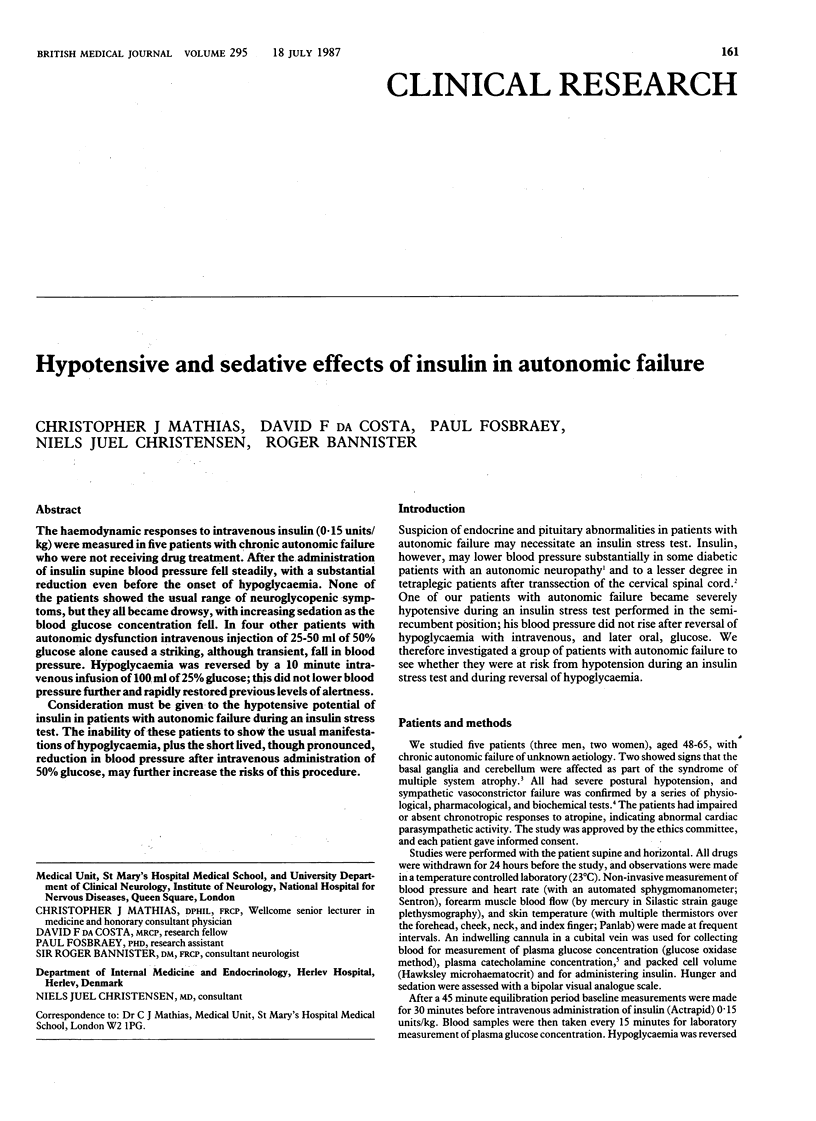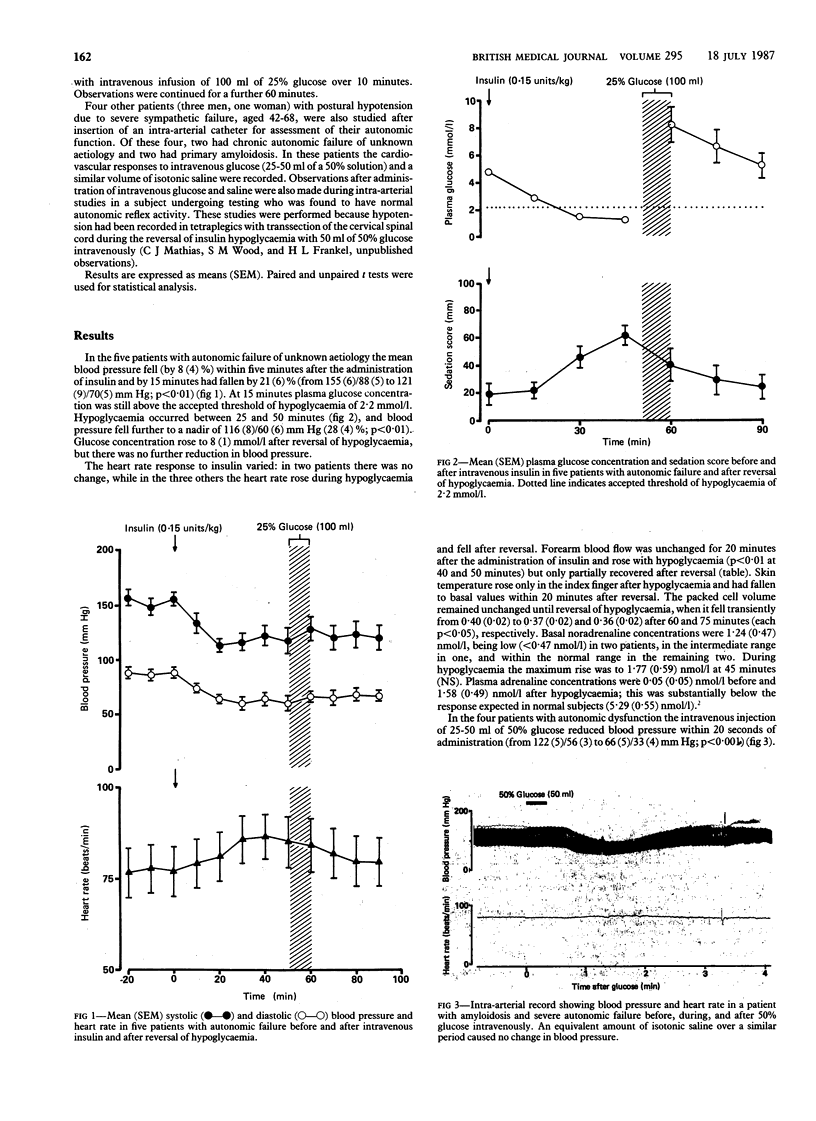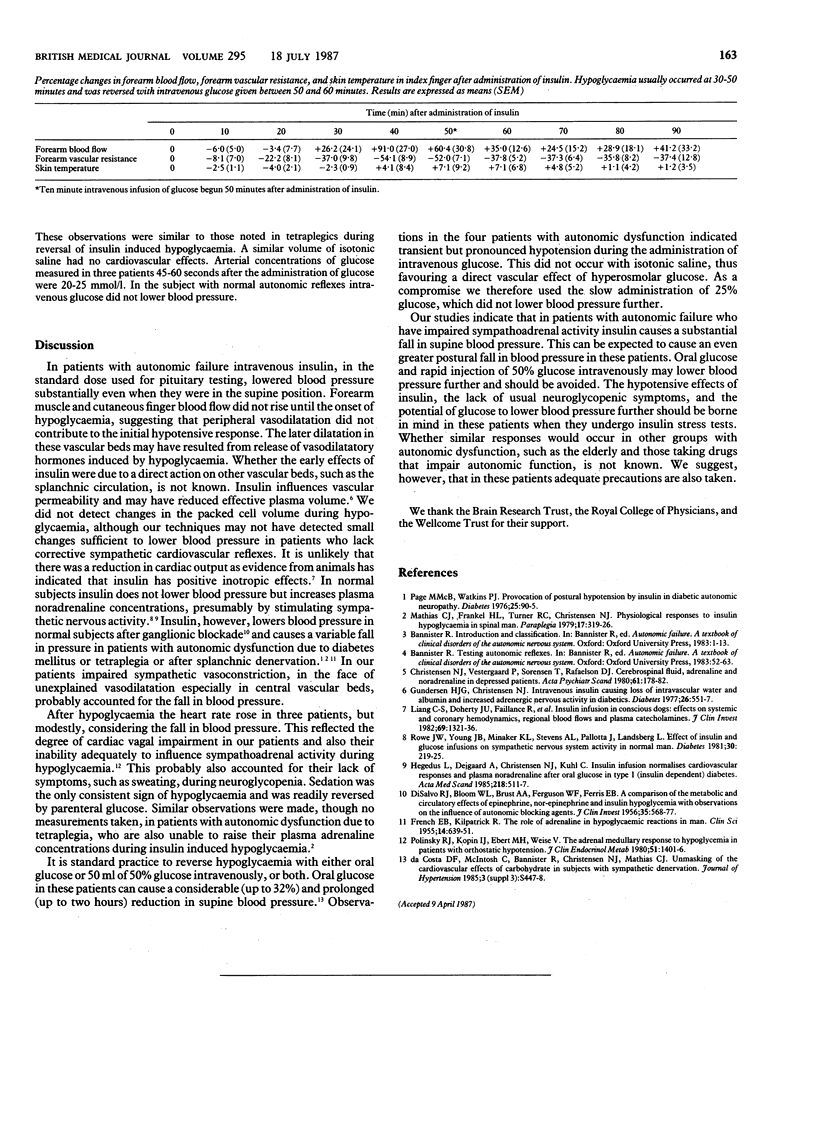Abstract
The haemodynamic responses to intravenous insulin (0.15 units/kg) were measured in five patients with chronic autonomic failure who were not receiving drug treatment. After the administration of insulin supine blood pressure fell steadily, with a substantial reduction even before the onset of hypoglycaemia. None of the patients showed the usual range of neuroglycopenic symptoms, but they all became drowsy, with increasing sedation as the blood glucose concentration fell. In four other patients with autonomic dysfunction intravenous injection of 25-50 ml of 50% glucose alone caused a striking, although transient, fall in blood pressure. Hypoglycaemia was reversed by a 10 minute intravenous infusion of 100 ml of 25% glucose; this did not lower blood pressure further and rapidly restored previous levels of alertness. Consideration must be given to the hypotensive potential of insulin in patients with autonomic failure during an insulin stress test. The inability of these patients to show the usual manifestations of hypoglycaemia, plus the short lived, though pronounced, reduction in blood pressure after intravenous administration of 50% glucose, may further increase the risks of this procedure.
Full text
PDF


Selected References
These references are in PubMed. This may not be the complete list of references from this article.
- Christensen N. J., Vestergaard P., Sørensen T., Rafaelsen O. J. Cerebrospinal fluid adrenaline and noradrenaline in depressed patients. Acta Psychiatr Scand. 1980 Feb;61(2):178–182. doi: 10.1111/j.1600-0447.1980.tb00577.x. [DOI] [PubMed] [Google Scholar]
- DISALVO R. J., BLOOM W. L., BRUST A. A., FERGUSON R. W., FERRIS E. B. A comparison of the metabolic and circulatory effects of epinephrine, nor-epinephrine and insulin hypoglycemia with observations on the influence of autonomic blocking agents. J Clin Invest. 1956 May;35(5):568–577. doi: 10.1172/JCI103310. [DOI] [PMC free article] [PubMed] [Google Scholar]
- Da Costa D. F., McIntosh C., Bannister R., Christensen N. J., Mathias C. J. Unmasking of the cardiovascular effects of carbohydrate in subjects with sympathetic denervation. J Hypertens Suppl. 1985 Dec;3(3):S447–S448. [PubMed] [Google Scholar]
- FRENCH E. B., KILPATRICK R. The role of adrenaline in hypoglycaemic reactions in man. Clin Sci. 1955 Nov;14(4):639–651. [PubMed] [Google Scholar]
- Gundersen H. J., Christensen N. J. Intravenous insulin causing loss of intravascular water and albumin and increased adrenergic nervous activity in diabetics. Diabetes. 1977 Jun;26(6):551–557. doi: 10.2337/diab.26.6.551. [DOI] [PubMed] [Google Scholar]
- Hegedüs L., Dejgaard A., Christensen N. J., Kühl C. Insulin infusion normalizes cardiovascular responses and plasma noradrenaline after oral glucose in type 1 (insulin-dependent) diabetes. Acta Med Scand. 1985;218(5):511–517. doi: 10.1111/j.0954-6820.1985.tb08882.x. [DOI] [PubMed] [Google Scholar]
- Liang C., Doherty J. U., Faillace R., Maekawa K., Arnold S., Gavras H., Hood W. B., Jr Insulin infusion in conscious dogs. Effects on systemic and coronary hemodynamics, regional blood flows, and plasma catecholamines. J Clin Invest. 1982 Jun;69(6):1321–1336. doi: 10.1172/JCI110572. [DOI] [PMC free article] [PubMed] [Google Scholar]
- Mathias C. J., Frankel H. L., Turner R. C., Christensen N. J. Physiological responses to insulin hypoglycaemia in spinal man. Paraplegia. 1979 Sep;17(3):319–326. doi: 10.1038/sc.1979.61. [DOI] [PubMed] [Google Scholar]
- Polinsky R. J., Kopin I. J., Ebert M. H., Weise V. The adrenal medullary response to hypoglycemia in patients with orthostatic hypotension. J Clin Endocrinol Metab. 1980 Dec;51(6):1401–1406. doi: 10.1210/jcem-51-6-1401. [DOI] [PubMed] [Google Scholar]
- Rowe J. W., Young J. B., Minaker K. L., Stevens A. L., Pallotta J., Landsberg L. Effect of insulin and glucose infusions on sympathetic nervous system activity in normal man. Diabetes. 1981 Mar;30(3):219–225. doi: 10.2337/diab.30.3.219. [DOI] [PubMed] [Google Scholar]


